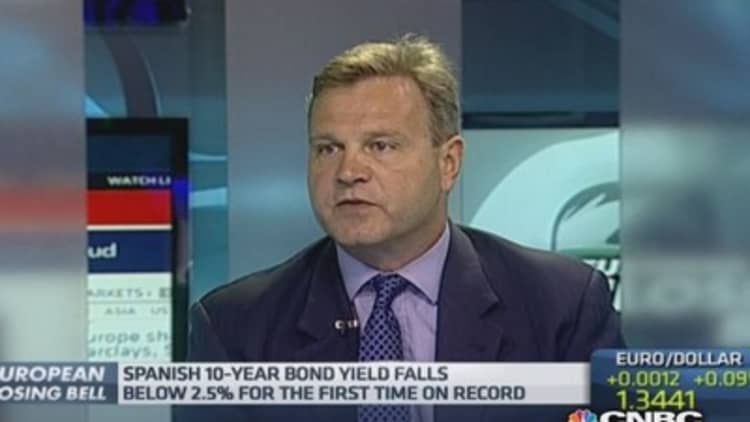In spite of the distinct lack of economic good news coming out of the euro zone, countries are finding it increasingly easy to borrow—thanks to record-low bond yields.
Yields on benchmark 10-year Spanish debt and "safe-haven" German Bunds have fallen over the past weeks, reaching all-time lows of 2.466 percent and 1.121 percent respectively on Tuesday.
German Government Bonds (BUND)
The Spanish yield, in particular, is surprising. Less than two years ago, Spain was at the epicenter of the euro zone's economic fears as the government was forced into taking a multibillion loan from its fellow euro members, so it could afford to prop up its banks. Now its 10-year bond yield, at 2.466 percent, is less than the 2.477 percent seen on U.S. Treasurys—conventionally viewed as the safest of all asset classes.
Bond yields for other riskier "peripheral" euro zone countries are also near lowest-ever levels. Italian 10-year debt continued declining on Tuesday, to yield only 2.639 percent. Irish bond yields also fell; Greek yields were marginally higher, after dropping over 14 basis points to end at 5.826 percent on Monday.
Although concerns remain about the euro zone as a whole—unemployment is stubbornly high and inflation is worryingly low—the bond rally may in part reflects signs of economic recovery in some of the zone's weakest members. For instance, Spanish Deputy Economy Minister Fernando Jimenez Latorre said on Monday that Spain could raise its growth forecast come September.
"The decline in Spain's 10-year yield reflects not only the fall of the inflation premium, but the risk premium in general," said analysts at BBH led by Marc Chandler in a research note on Tuesday.
"This risk premium included a risk that the euro zone would break up (redenomination risk) and that Spain would default. The risks have also fallen, though they are more difficult to measure."

In the case of Greece, another economy on the verge of collapse just a few years ago, demand for sovereign debt has been boosted by hopes the country's credit rating will be upgraded this Friday. This follows Greece's successful return to the public bond market in April, and a one-notch upgrade to Portugal's rating last Friday.
Across the euro zone, yields are also being pressured lower by the European Central Bank's record-low base rate of 0.15 percent. The Bank is seen keeping interest rates low for the foreseeable future, and could yet use some form of quantitative easing, probably involving government bond purchases.
"This would presumably help to keep the yields of core euro-zone sovereign bonds low, even if they are dragged up slightly by developments overseas," said Jack Allen of Capital Economics in a research note on Monday. The economic consultancy forecasts yields for Bunds and Treasurys will diverge further, reaching 2 percent and 4 percent respectively by end-2016.
—By CNBC's Katy Barnato


